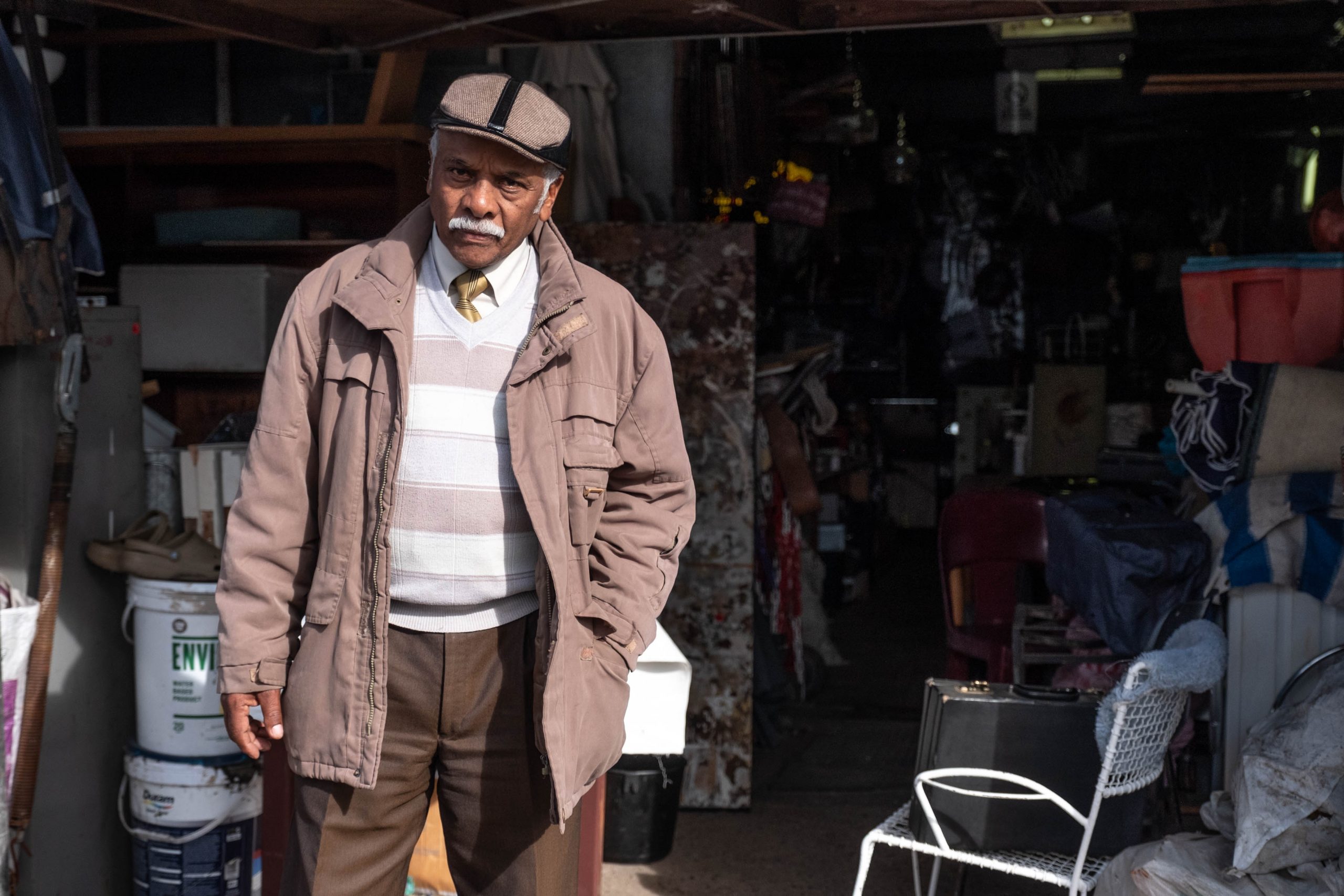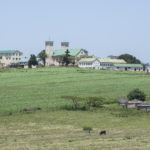The Church’s stranglehold on Klipfontein
The Klipfontein Mission Station owned by the SA Methodist Church has mostly ignored complaints of families living in the area. But some local people remain loyal to the area of their birth.
Author:
18 September 2019

There is no road, only sand. Thick black electric cables stretch across the sky to the small homes that need them. The area is mostly quiet, with the whoosh of cars making the most noise from the busy road. Most drivers won’t even notice that they’re passing by a church-owned mission station. But the community here has existed for generations. Largely unserviced and neglected by their landlords, the Southern Africa Methodist Church, the community is now taking legal action to get their land back.
The Adriaanse family resides all over the Klipfontein Mission Station. The five siblings, now old and weary, walk past one another regularly. Danny Adriaanse, 64, is by far the most well-known family member in the area. People wave and greet him with a “Hello, Uncle Danny” as he potters around his bric-a-brac store.
Danny once led the community committee responsible for representing and helping residents in the area. Now a new committee, the Klipfontein Communal Property Trust, has developed under the leadership of Yvonne Barthies. An avid believer in the community, Barthies has sought legal action to force the church to hand the property over to residents.
But the church, which has held the deed to the property since the 1800s, has kept its hold on this land for more than a century. The mission station is where famed anti-apartheid activist Dulcie September grew up; it sits between the townships of Nyanga and Philippi. Yet barely anyone knows of its existence – except for the people who fight for it. There’s no trace of Klipfontein Mission Station on Google Maps.

Church-owned land
In the 1800s, the church became the trustees of the vast expanse of land next to the Cape Town International Airport. Generations of families had been living on the land and it was a popular outpost for nearby communities because there was a post office in the area.
But the living is hard in Klipfontein. Large parts of the area have no access to electricity and some homes have to share taps for running water. The area has only one tarred road. No houses have been provided to community members who have spent decades raising their families in the area.
For the City of Cape Town to provide services, it requires permission from the church because the land, under the ownership of the church, is private property. There are 1 139 households in the area.
But with the standard of living worsening over the years, residents have become more desperate. Pearl Davids, 54, is an activist in the area who has watched for years as crime and poverty have spiralled. Davids’ father was incapacitated in a severe car accident when she was in primary school. In subsequent years, she was forced to leave high school to find a job, as the family’s financial struggle turned dire. She is committed to living in the mission station because she knows what it’s like to struggle for basic needs.
Related article:
“Sometimes I had bread, and sometimes I didn’t have bread,” she says. “And now you can see why I’m still living here. I know how it feels. If I can help someone else to better their situation, it makes me feel good because I know the pain to be without food.”
Davids says that crime in the area has increased because gangsters from neighbouring townships have recruited youngsters from the mission station. Tik use and alcoholism are rife in the area, but when Davids sees a young man stripping a stolen car near her house, she’s not afraid to yell at him.
“I did confront one of the guys. They know about Auntie Pearl here,” she says with a smile.
In the mission station, it’s largely been up to residents to help one another as they’ve lost trust in their landlord.

Fighting for heritage and the future
Danny believes that Klipfontein forms part of the “ancestral land” where generations of “so-called coloureds” lived in the Cape. There is a legend that in some parts of the mission station that the church, when it first came into the community, burned the documents of families who confirmed their land ownership to destroy any trace that the land had previous owners.
This folklore forms part of the anger Danny has for the Methodist Church. “Their main target was land. They needed land. They never brought land with the ships when they came. The subtle way they went about acquiring land is still evident today. It’s a subtlety that can only come from the devil,” he says.
Barthies has refused to air her own views of the mission station because of the looming court action. No court papers have yet been filed, but process for legal action is underway. In an interview with the Cape Times in 2015, she described the area as the community’s “inheritance”.
“This is our heritage. The land belongs to a certain group of people. The land has always belonged to our ancestors,” she said at the time.
By late August, just a few metres from Barthies’ house, a fire hydrant, which had been giving trouble for six weeks, started leaking significantly. Danny and Barthies informed the City of Cape Town about the leak, but officials only agreed to come visit the area at another time. Meanwhile, the houses of three residents were flooded to almost knee level.
Related article:
The City of Cape Town says it is “investigating the complaint” about the leak, but residents have taken it upon themselves to push for action, believing the church does not care.
In one family, a grandmother and her daughter built a shack next to their house so that they had somewhere dry to sleep. A precarious path of big cement blocks and wooden pallets poked out of the water to form a walkway to their flooded house.
“What is so sad, property ownership aside, is they have never done anything for the people here,” says Danny. “That is so sad about these people who say they are missionaries from God.”
The church has declined to respond to questions, saying that it is involved in “very sensitive legal processes” in the area.
“Our church has worship services every Sunday in the area and serves in the community as a testimony to the light of Christ shining in the darkest of circumstances,” says Reverend Yvette Moses, the church’s district bishop.
But for one member of the community trust, the future of the mission station is bleak.
“I don’t know how long I have left to live, and I want to see Klipfontein developed,” one of the trustees says.

Divided views
But not everyone agrees about the tension in the community.
Gene Adriaanse, 65, Danny’s sister-in-law, is still fiercely devoted to the church. She feels that the church has done her a kindness by allowing her to live on its land. She plays with her grandchild as she talks about her commitment to the church.
“I grew up here. I’ve lived here all my life,” she says. “I must be happy with the church. They’ve done a lot for me. If they had to tell me to live somewhere else, I would move. ”
Gene’s husband died less than a year ago. There is no clinic nearby the mission station, so each time he needed help with his illness the couple would have to walk to the bus stop, take the bus to Philippi Clinic and then make the journey home after he had received help.
Gene says she will never leave Klipfontein, because she has never lived anywhere else. There are some who agree with her, but others have found a better life after moving out of the area.
Related article:
After 32 years in the area, Gene’s daughter-in-law, Shannon Adriaanse, made the decision to leave. Shannon now only comes back to Klipfontein to look after her mother-in-law but has no regrets about leaving. Her aunt, uncle and son were murdered in what was seemingly an execution-style killing next door to her Klipfontein home, which spurred her to flee the violence and move to Blue Downs near Khayelitsha.
“I have no hope for Klipfontein anymore. I will just advise everyone to move if they can. Get out if you can,” Shannon says.
For her, the church is at the heart of why young people, who have no place to play or entertain themselves in the area, suffer and turn to drugs and crime.
“I blame them because they are depriving the people of better living. I’ve been living here for 32 years, I’ve heard talks that they were gonna build houses and develop the place but up until today there has been no developing. There’s no high school, no clinic close by, nothing.”

The younger generations
Danny describes the dispossession of his family’s land by the church as an “evil deed”. His family is waiting for a land claim to be settled for 92 hectares of farm land, known as Driftsands in the area of Delft, that they were forced to hand over to the apartheid regime. They have waited 21 years for restitution.
In that time, they were forced to live in Klipfontein mission station. Danny made it out of the area and now lives in Mitchell’s Plain after he began to make a living as a welder. But five of his siblings still live in shacks around the mission station. They are too old to work, but they still try to push themselves so that they can make ends meet.
“The majority of us, they are living from hand to mouth. These are all things that have evolved since that evil deed of dispossession and oppression. There’s nothing you can do about it. You’ve just got to live from hand to mouth and from day to day in order to survive. But thankfully we made it up to now,” he says.

Danny’s hope is that his siblings can one day own their land in Klipfontein and that some land from Driftsands is restored to the hands of his family. His fear is that when he dies, his children will continue to suffer the dispossession that has haunted the family since apartheid.
“My family is planning to set something up. For us, it’s already too late. The children and grandchildren and great grandchildren should have something for them so they can enjoy a better standard of living,” he says.




